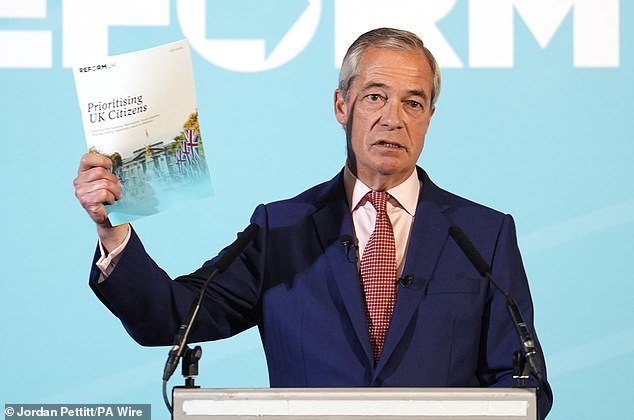Reform UK has vowed to axe the right of migrants to qualify for permanent settlement in Britain after five years if it wins the next election.
The status, known as indefinite leave to remain (ILR), allows people who have lived here for more than five years to apply for British citizenship and claim benefits.
Nigel Farage, the party’s leader, said the change would apply both to new applicants and those who already have been granted the status – raising the possibility they could then be deported.
Mr Farage suggested ending the status will save £234billion that would be paid out in benefits for them and their dependants in the coming decades.
Conservative shadow home secretary Chris Philp accused Reform of copying Conservative ideas and called the policy ‘half-baked and unworkable’.
He said: ‘They lift our policies but strip away the detail that makes them enforceable. Mass low-skill migration carries real fiscal costs – in housing, welfare, and public services – which is why Britain needs a system that rewards contribution and stops abuse.’
Here are the key questions answered –

Nigel Farage, Reform UK leader, said the change would apply both to new applicants and those who already have been granted the status – raising the possibility they could then be deported.
What is indefinite leave to remain (ILR)?
ILR is an immigration status that gives migrants the right to live, study and work in the UK without time restrictions.
It allows holders to use the NHS without paying the Immigration Health Surcharge (IHS) and claim benefits.
Most people need to have ILR for at least 12 months before applying for British citizenship.
Who is eligible for the status?
Under the present system, migrants can apply for ILR after living legally in the UK for five years.
This reduces to two or three years for those with tier 1 visas, which were handed to entrepreneurs.
Those with Innovator Founder or Global Talent visas – which replaced tier 1 visas, may have to wait three years.
Refugees can apply for IRL five years after their grant of refugee status.
How many people have it?
Oxford University’s Migration Observatory estimate that roughly 430,000 non-EU citizens were granted an initial visa from 2005 onwards and now hold ILR but not citizenship, although some may have emigrated.
There will be others who arrived before this period, however. So overall, the number of non-EU citizens with ILR is likely to be in the hundreds of thousands.
While there have been over 4million grants of settled status to EU citizens, the Migration Observatory says it lacks good data on how many are still in the UK or have become citizens
Reform estimates 3.8million migrants who arrived after the pandemic will be eligible for ILR between 2026 and 2030.
What is Reform proposing?
Mr Farage wants to abolish indefinite leave to remain and force them to renew their visa every five years.
Applicants would have to meet certain criteria, including a higher salary threshold and better standard of English.
Reform were unable to give a specific figure for a salary cap today, but said it would do so down the line.
Who could be affected?
Under Nigel Farage’s plan, no new ILR awards would be made and migrants already allowed to live here under ILR would have it rescinded.
Dr Ben Brindle, Researcher at the Migration Observatory, predicted that the groups that will feel the largest impact would be refugees and the family members of British citizens, who are less likely to meet economic or language requirements.
Mr Farage has said the rule would not apply to around six million EU nationals living in the UK with settled status after Brexit.
What are critics saying?
Critics have questioned the implications for the NHS of deporting migrants on lower salaries, who often work in the health sector. Reform has not decided what the minimum salary would be for visas.
It is unclear what would happen to individuals with settled status who have British children, or to pensioners who no longer work.
Ashley Stothard, an immigration lawyer at Freeths, called the plan ‘outrageous’.
‘It undermines the rights of lawful migrants who have contributed to the UK socially, economically, and culturally,’ she said.
The Centre for Policy Studies think-tank originally made the £234billion estimate for benefits costs from axing ILR but has since withdrawn it.
Chancellor Rachel Reeves said the figures show Reform’s plans ‘have no basis in reality’. The Tories branded the proposals ‘half-baked and unworkable’.
London mayor Sadiq Khan said: ‘Thousands of Londoners have indefinite leave to remain. They have legal rights and are our friends, neighbours and colleagues… threatening to deport people living and working here legally is unacceptable.’












